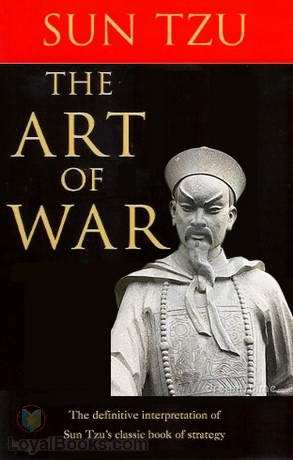
The Art of War is a 6th Century BC Chinese treatise on war and military strategy known for its timeless examples of strategy and planning. There is intense interest in this ancient work since it teaches how to be victorious in conflict and that the final victory ultimately is to see war as an effort to win minds and hearts rather than a mere acquisition of territory and wealth.
The Art of War by Sun Tzu is a two thousand year old work, reputedly authored by a famous military general and strategist who lived in ancient China. Apart from this, he is also revered and respected in many South Asian countries as a learned philosopher. The book is divided into thirteen chapters and there is historical evidence to prove that it was written over a period of time and perhaps with many borrowings and collaborations with other similar works of the period. However, it was also heavily criticized by generations of scholars and thinkers in later centuries as it advocated deception and spying as accepted strategies in war. Many scholars have also doubted whether a figure such as Sun Tzu existed at all and have found several inaccuracies in terms of the timeframe in which the book was supposed to have been written. Many feel that the original work may have undergone several revisions over the centuries before being consolidated in its present form. Whatever the nature of these opinions The Art of War remains a fascinating, valuable and extremely interesting work.
Each chapter explores a different aspect of war. Beginning with elaborate plans that should be put in place before the commencement of war, the book goes on to describe different situations in which wars are fought, the kind of strategies employed in various types of terrain, understanding the nature of the enemy and finally positioning, timing and methods of attack.
For present day corporate warriors, The Art of War is an invaluable text. Business management, sports and politics are some of the fields where it has found immense application. Conflict resolution theory has been immeasurably enhanced with the addition of Sun Tzu’s millennia-old tried and tested methods. It also provides valuable assistance in the grooming of leaders, understanding and appreciating the opponent and leveraging one’s own advantages.
The Art of War provides compelling reading for anyone who is interested in the dynamics of negotiation, competition, mediation, planning and arbitration.

Other Audiobook
Audiobook: Joseph Conrad: A Personal Remembrance
Joseph Conrad (1857 – 1924) was a Polish-British writer regarded as one of the greatest
Audiobook: Blunderer, or The Counterplots
A very early Moliere. From the Translator: “In this piece the plot is carried on
Audiobook: Pee-Wee Harris in Luck
Another episode in the life of the loveable Pee-Wee Harris, Boy Scout and Boy of
Audiobook: Civilian Clothes
What happens when wartime romance and talents encounter the post-war civilian world? “I’m going to
Audiobook: Rinkitink in Oz (version 2)
Prince Inga lives a happy life on the island of Pingaree until one day invaders
Audiobook: Historia de la vida del Buscón, llamado Don Pablos, ejemplo de vagabundos y espejo de tacaños
Clásica novela picaresca española del Siglo de Oro, del gran Don Francisco de Quevedo. En
Audiobook: Meridiana: The adventures of three Englishmen and three Russians in South Africa
Three Englishmen and Three Russians travel across the width of South Africa to measure a
Audiobook: Love Chase
In this romantic comedy from 1837, three sets of mismatched lovers bicker, woo, spar, and
Audiobook: The Island of Dr. Moreau
One of the first instances of science fiction, Wells’ classic tale published in 1986 examines
Audiobook: U.S. Marine Operations in Korea, 1950-1953, Volume 2: The Inchon-Seoul Operation
The Inchon Landing was a major amphibious operation, planned in record time and executed with
Audiobook: The Problems of Philosophy
Published in 1912, The Problems of Philosophy by Bertrand Russell is one of his most
Audiobook: Republic
The Republic is a Socratic dialogue by Plato, written in approximately 380 BC. It is